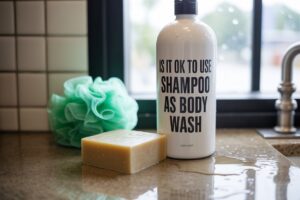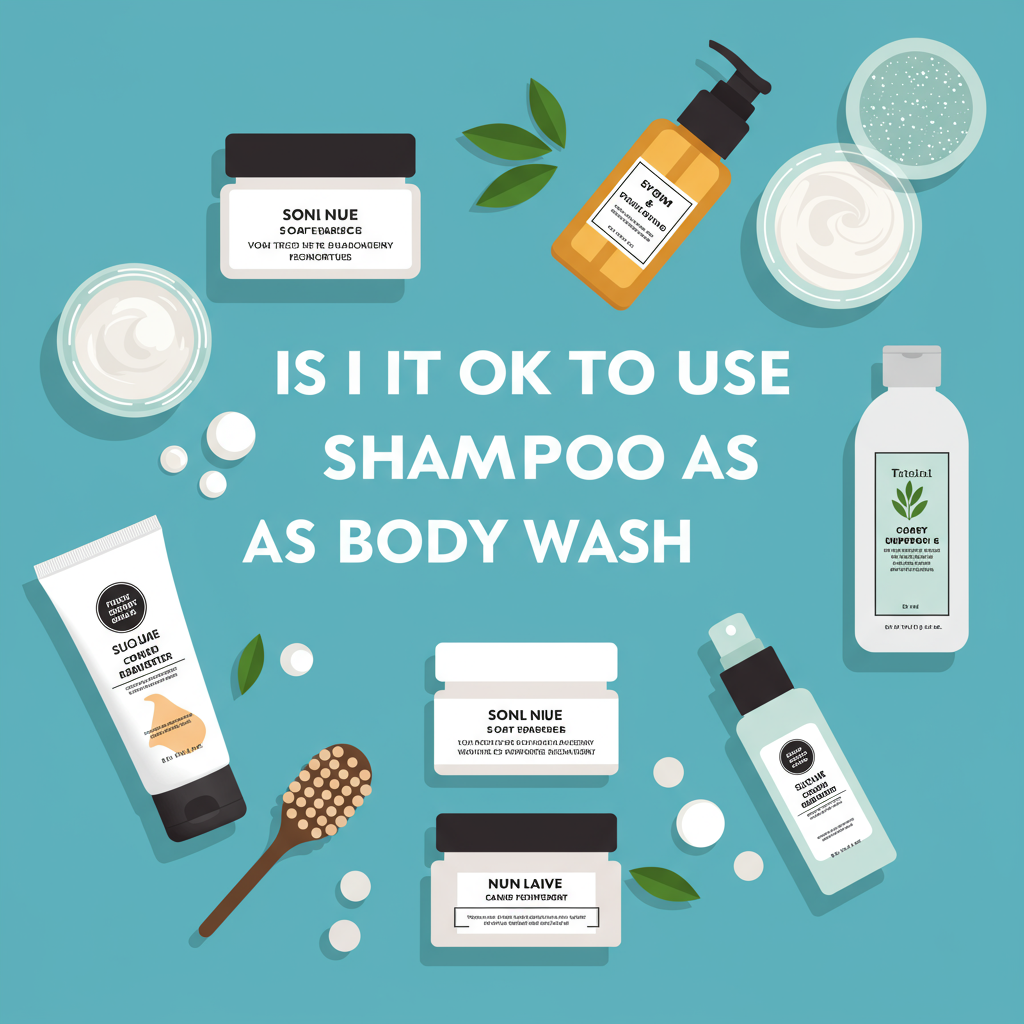We’ve all been there: you step into the shower, reach for your body wash, and realize the bottle is empty. Panic sets in, followed by a quick glance at the shampoo bottle. A thought crosses your mind: “Is it OK to use shampoo as body wash?” This common shower dilemma sparks a lot of questions, from skin health to product effectiveness. While it might seem like a quick fix, the truth is a bit more nuanced than a simple yes or no.

In this comprehensive guide, we’ll explore the fundamental differences between shampoo and body wash, delve into the potential pros and cons of using shampoo on your body, and provide practical advice for those moments when you’re truly in a pinch. We’ll discuss who should absolutely avoid this practice and offer tips to minimize any potential negative effects. By the end, you’ll have a clear understanding of whether using shampoo as body wash is a harmless shortcut or a beauty blunder.
Shampoo vs. Body Wash: Understanding the Core Differences
At first glance, shampoo and body wash might appear to be interchangeable liquids designed for cleaning. However, their formulations are tailored to meet the distinct needs of hair and skin. Understanding these differences is crucial to answering the question: Is it OK to use shampoo as body wash?
The Science of Hair Cleaning: Shampoo’s Role
- Purpose: Shampoos are primarily formulated to clean hair and scalp. This means removing dirt, oil (sebum), product buildup, and environmental pollutants without stripping the hair of its natural moisture entirely.
- Surfactants: They often contain stronger cleansing agents (surfactants) designed to break down the oils found on the scalp and hair shaft. These can be more aggressive than those in body washes.
- Conditioning Agents: Many shampoos include conditioning ingredients (like silicones, polymers, and oils) to smooth the hair cuticle, reduce frizz, add shine, and make hair manageable. These can leave a residue on the skin.
- pH Level: Shampoos typically have a pH level that is slightly acidic (around 5.5 to 6.5) to help close the hair cuticle and maintain scalp health.
The Science of Skin Cleaning: Body Wash’s Role
- Purpose: Body washes are designed to cleanse the skin, removing sweat, dirt, and surface oils, while also maintaining the skin’s delicate moisture barrier.
- Milder Surfactants: They generally use gentler surfactants that are less likely to strip the skin of its natural oils, which can lead to dryness and irritation.
- Moisturizing Ingredients: Body washes often contain humectants (like glycerin) and emollients (like shea butter or various oils) to hydrate and nourish the skin, leaving it soft and supple.
- pH Level: Body washes are usually formulated to be closer to the skin’s natural pH, which is slightly acidic (around 4.5 to 5.5), to support the skin’s acid mantle.
When It’s (Potentially) Okay to Use Shampoo as Body Wash
While not ideal for regular use, there are specific situations where using shampoo as body wash might be acceptable, or at least understandable.
Emergency Situations
When you’re traveling, at the gym, or simply run out of body wash, using shampoo as a temporary substitute can be a practical solution. For a single wash, the likelihood of severe adverse effects is generally low for individuals with non-sensitive skin.
Specific Shampoo Types
Not all shampoos are created equal. Some are milder than others:
- Gentle/Sensitive Skin Shampoos: These are often formulated with fewer harsh chemicals, fragrances, and dyes, making them less irritating if used on the body.
- Baby Shampoos: Known for their “no-tears” formulas, baby shampoos are extremely mild and hypoallergenic, making them a safer option for body cleansing, even for adults.
- Sulfate-Free Shampoos: Shampoos without sulfates (like SLS/SLES) tend to be less stripping, which could translate to less dryness when used on the skin.
- Multi-Purpose Washes: Some brands offer 2-in-1 or 3-in-1 products designed for hair, face, and body. These are explicitly formulated for versatility and are the safest bet if you’re looking for an all-in-one solution.
In these limited scenarios, is it OK to use shampoo as body wash? The answer leans towards ‘yes, with caution.’
The Potential Downsides: Why You Might Want to Reconsider
While a one-off use might be fine, regular shampoo as body wash use can lead to several undesirable outcomes for your skin.
Skin Dryness and Irritation
The stronger surfactants in shampoo, designed to cut through hair oils, can strip the skin of its natural protective lipids. This can lead to:
- Dryness: Your skin may feel tight, flaky, or rough.
- Itchiness: The skin’s barrier is compromised, making it more susceptible to irritants.
- Redness: Especially for those with sensitive skin.
Residue and Clogged Pores
Shampoos often contain conditioning agents like silicones, waxes, and heavy oils that are great for hair but not so much for skin. These ingredients can:
- Leave a Film: A greasy or sticky residue might be left on your skin, especially if not rinsed thoroughly.
- Clog Pores: This residue can accumulate in pores, potentially leading to breakouts, body acne, or folliculitis (inflammation of hair follicles).
Impact on Sensitive Skin Conditions
For individuals with pre-existing skin conditions, using shampoo as body wash can exacerbate symptoms:
- Eczema/Psoriasis: The harsh ingredients can trigger flare-ups, leading to increased inflammation, itching, and discomfort.
- Acne-Prone Skin: The pore-clogging ingredients can worsen body acne.
- Allergies: Many shampoos contain fragrances, dyes, and preservatives that can be common allergens, causing contact dermatitis on sensitive body skin.
Who Should Absolutely Avoid Using Shampoo As Body Wash?
While some can get away with it occasionally, certain individuals should steer clear of using shampoo as body wash at all costs to protect their skin health.
- Individuals with Very Sensitive Skin: If your skin reacts easily to new products, fragrances, or changes in your routine, shampoo is likely to cause irritation.
- People with Eczema, Psoriasis, or Rosacea: These conditions mean your skin barrier is already compromised. Harsh shampoo ingredients can trigger severe flare-ups.
- Those Prone to Body Acne: If you frequently experience breakouts on your back, chest, or other areas, the conditioning agents and stronger surfactants in shampoo can worsen the problem by clogging pores.
- Anyone with Known Fragrance or Dye Allergies: Shampoos are often heavily fragranced and colored, which are common irritants for allergic skin.
- Children and Infants (unless using specific baby wash/shampoo): Their skin is much thinner and more delicate than adult skin, making them highly susceptible to dryness and irritation from adult shampoo formulas.
Tips for Using Shampoo as Body Wash (If You Must)
If you find yourself in a bind and have no other option, here are some practical tips to minimize the potential negative effects when using shampoo as body wash:
- Choose Wisely: Opt for the mildest shampoo available. Look for “gentle,” “sulfate-free,” “fragrance-free,” or “baby shampoo” formulas. Avoid shampoos designed for oily hair, clarifying shampoos, or those with heavy conditioning agents.
- Dilute It: Mix a small amount of shampoo with water in your hand or on a washcloth before applying it to your skin. This can help reduce the concentration of harsh ingredients.
- Use Sparingly: You don’t need a lot. A small amount goes a long way.
- Focus on Key Areas: Prioritize areas that truly need cleansing, like armpits, groin, and feet, rather than lathering your entire body excessively.
- Rinse Thoroughly: This is perhaps the most crucial step. Ensure you rinse off all shampoo residue from your skin to prevent irritation and clogged pores. Spend extra time under the water.
- Moisturize Immediately: After showering, pat your skin dry and apply a good quality, fragrance-free moisturizer while your skin is still slightly damp. This helps to replenish lost moisture and support your skin barrier.
Recommended Products
If you frequently find yourself without body wash, or if you’re concerned about skin dryness and irritation, investing in a gentle, multi-purpose product or keeping a good moisturizer on hand can be a game-changer. Here are a few suggestions:
CeraVe Hydrating Body Wash
A dermatologist-recommended, fragrance-free body wash with ceramides and hyaluronic acid to cleanse and hydrate dry skin without stripping moisture. Perfect for daily use.
Vanicream Moisturizing Lotion
A gentle, fragrance-free, paraben-free, and formaldehyde-free moisturizer perfect for sensitive skin, helping to soothe and protect the skin barrier after cleansing.
Dr. Bronner’s Pure-Castile Liquid Soap (Unscented)
A highly versatile, concentrated soap that can be diluted for various uses, including body wash. Choose the unscented version for minimal irritation. A great emergency multi-purpose option.
Frequently Asked Questions (FAQ) About Using Shampoo As Body Wash
Q1: Can I use shampoo on my face?
A: Generally, no. Facial skin is even more delicate and prone to irritation and breakouts than body skin. Shampoos are too harsh for the face and can strip its natural oils, leading to dryness, redness, or acne. Always use a dedicated facial cleanser.
Q2: What happens if I use shampoo on my body daily?
A: Regular, daily use of shampoo as body wash can lead to cumulative negative effects. You might experience persistent skin dryness, itchiness, flakiness, irritation, and potentially an increase in body acne due to pore-clogging ingredients. It can disrupt your skin’s natural barrier over time.
Q3: Is baby shampoo safe for adult bodies?
A: Baby shampoo is one of the safest options if you absolutely must use shampoo as body wash. Its “no-tears” formula signifies very mild surfactants and often a lack of harsh chemicals, fragrances, and dyes. While not ideal for regular adult use, it’s far less irritating than standard adult shampoos for a temporary fix.
Q4: Are all shampoos equally bad for body wash?
A: No, there’s a spectrum. Clarifying shampoos or shampoos for oily hair are generally the worst due to their strong oil-stripping capabilities. Shampoos with heavy conditioners or those targeting specific hair concerns (like color-treated hair with strong chemicals) can also be problematic. Sulfate-free, gentle, or natural shampoos would be less harsh than their conventional counterparts, but still not specifically formulated for skin.
Q5: What’s the main chemical difference between shampoo and body wash?
A: The primary difference lies in the type and concentration of surfactants (cleansing agents) and the inclusion of conditioning/moisturizing ingredients. Shampoos typically use stronger, more anionic surfactants to remove hair oils, and often contain silicones or heavy oils. Body washes use milder surfactants and are rich in humectants and emollients to hydrate the skin.
Q6: Will using shampoo as body wash cause body acne?
A: It certainly can, especially if you’re prone to body acne or have oily skin. The conditioning agents in shampoo can leave a residue that clogs pores on your body, leading to breakouts. Additionally, the harsh surfactants can irritate the skin, disrupting its natural balance and making it more susceptible to acne-causing bacteria.
Conclusion: The Verdict on Shampoo as Body Wash
So, is it OK to use shampoo as body wash? In a pinch, for a single, rare occasion, and with the right type of shampoo (gentle, mild, or baby shampoo), it might be acceptable for most individuals with non-sensitive skin. However, it is by no means an ideal or recommended long-term solution. Shampoo formulations are specifically designed for hair and scalp, which have different needs than the skin on your body.

Regularly using shampoo as body wash can lead to dryness, irritation, clogged pores, and exacerbate existing skin conditions. Prioritizing your skin’s health means using products specifically formulated for its unique needs. If you find yourself frequently running out of body wash, consider keeping a travel-sized bottle of a gentle body wash, a bar of soap, or even a multi-purpose wash on hand. Your skin will thank you for the extra care.
Remember, a little preparation goes a long way in maintaining healthy, happy skin. When in doubt, always opt for products designed for their intended purpose.
